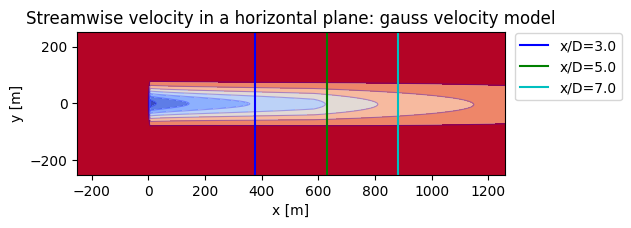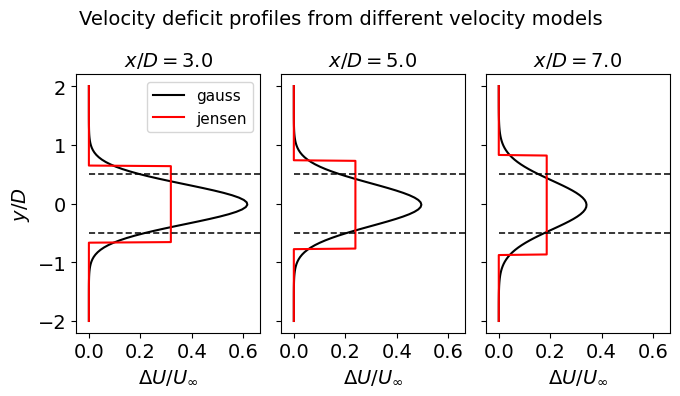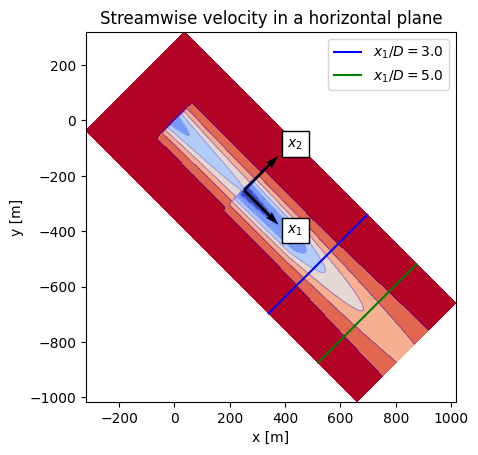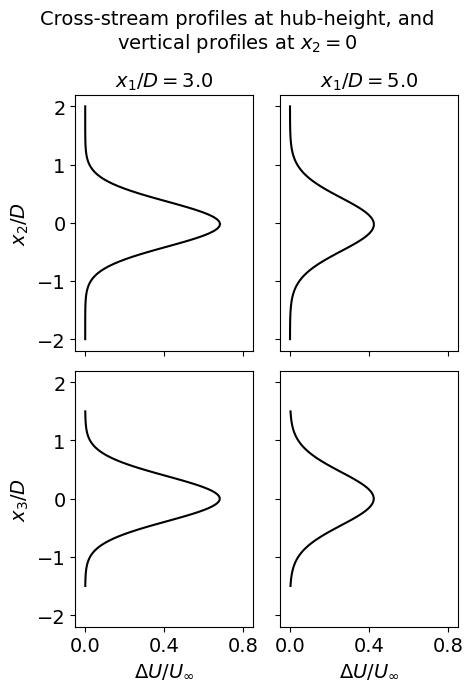"""Example: Plot velocity deficit profiles
This example illustrates how to plot velocity deficit profiles at several locations
downstream of a turbine. Here we use the following definition:
velocity_deficit = (homogeneous_wind_speed - u) / homogeneous_wind_speed
, where u is the wake velocity obtained when the incoming wind speed is the
same at all heights and equal to `homogeneous_wind_speed`.
"""
import matplotlib.pyplot as plt
import numpy as np
from matplotlib import ticker
import floris.flow_visualization as flowviz
from floris import FlorisModel
from floris.flow_visualization import VelocityProfilesFigure
from floris.utilities import reverse_rotate_coordinates_rel_west
# The first two functions are just used to plot the coordinate system in which the
# profiles are sampled. Please go to the main function to begin the example.
def plot_coordinate_system(x_origin, y_origin, wind_direction):
quiver_length = 1.4 * D
plt.quiver(
[x_origin, x_origin],
[y_origin, y_origin],
[quiver_length, quiver_length],
[0, 0],
angles=[270 - wind_direction, 360 - wind_direction],
scale_units="x",
scale=1,
)
annotate_coordinate_system(x_origin, y_origin, quiver_length)
def annotate_coordinate_system(x_origin, y_origin, quiver_length):
x1 = np.array([quiver_length + 0.35 * D, 0.0])
x2 = np.array([0.0, quiver_length + 0.35 * D])
x3 = np.array([90.0, 90.0])
x, y, _ = reverse_rotate_coordinates_rel_west(
fmodel.wind_directions,
x1[None, :],
x2[None, :],
x3[None, :],
x_center_of_rotation=0.0,
y_center_of_rotation=0.0,
)
x = np.squeeze(x, axis=0) + x_origin
y = np.squeeze(y, axis=0) + y_origin
plt.text(x[0], y[0], "$x_1$", bbox={"facecolor": "white"})
plt.text(x[1], y[1], "$x_2$", bbox={"facecolor": "white"})
if __name__ == "__main__":
D = 125.88 # Turbine diameter
hub_height = 90.0
homogeneous_wind_speed = 8.0
fmodel = FlorisModel("../inputs/gch.yaml")
fmodel.set(layout_x=[0.0], layout_y=[0.0])
# ------------------------------ Single-turbine layout ------------------------------
# We first show how to sample and plot velocity deficit profiles on a single-turbine layout.
# Lines are drawn on a horizontal plane to indicate were the velocity is sampled.
downstream_dists = D * np.array([3, 5, 7])
# Sample three profiles along three corresponding lines that are all parallel to the y-axis
# (cross-stream direction). The streamwise location of each line is given in `downstream_dists`.
profiles = fmodel.sample_velocity_deficit_profiles(
direction="cross-stream",
downstream_dists=downstream_dists,
homogeneous_wind_speed=homogeneous_wind_speed,
)
horizontal_plane = fmodel.calculate_horizontal_plane(height=hub_height)
fig, ax = plt.subplots(figsize=(6.4, 3))
flowviz.visualize_cut_plane(horizontal_plane, ax)
colors = ["b", "g", "c"]
for i, profile in enumerate(profiles):
# Plot profile coordinates on the horizontal plane
ax.plot(profile["x"], profile["y"], colors[i], label=f"x/D={downstream_dists[i] / D:.1f}")
ax.set_xlabel("x [m]")
ax.set_ylabel("y [m]")
ax.set_title("Streamwise velocity in a horizontal plane: gauss velocity model")
fig.tight_layout(rect=[0, 0, 0.82, 1])
ax.legend(bbox_to_anchor=[1.29, 1.04])
# Initialize a VelocityProfilesFigure. The workflow is similar to a matplotlib Figure:
# Initialize it, plot data, and then customize it further if needed.
profiles_fig = VelocityProfilesFigure(
downstream_dists_D=downstream_dists / D,
layout=["cross-stream"],
coordinate_labels=["x/D", "y/D"],
)
# Add profiles to the VelocityProfilesFigure. This method automatically matches the supplied
# profiles to the initialized axes in the figure.
profiles_fig.add_profiles(profiles, color="k")
# Change velocity model to jensen, get the velocity deficit profiles,
# and add them to the figure.
floris_dict = fmodel.core.as_dict()
floris_dict["wake"]["model_strings"]["velocity_model"] = "jensen"
fmodel = FlorisModel(floris_dict)
profiles = fmodel.sample_velocity_deficit_profiles(
direction="cross-stream",
downstream_dists=downstream_dists,
homogeneous_wind_speed=homogeneous_wind_speed,
resolution=400,
)
profiles_fig.add_profiles(profiles, color="r")
# The dashed reference lines show the extent of the rotor
profiles_fig.add_ref_lines_x2([-0.5, 0.5])
for ax in profiles_fig.axs[0]:
ax.xaxis.set_major_locator(ticker.MultipleLocator(0.2))
profiles_fig.axs[0, 0].legend(["gauss", "jensen"], fontsize=11)
profiles_fig.fig.suptitle(
"Velocity deficit profiles from different velocity models",
fontsize=14,
)
# -------------------------------- Two-turbine layout --------------------------------
# This is a two-turbine case where the wind direction is north-west. Velocity profiles
# are sampled behind the second turbine. This illustrates the need for a
# sampling-coordinate-system (x1, x2, x3) that is rotated such that x1 is always in the
# streamwise direction. The user may define the origin of this coordinate system
# (i.e. where to start sampling the profiles).
wind_direction = 315.0 # Try to change this
downstream_dists = D * np.array([3, 5])
floris_dict = fmodel.core.as_dict()
floris_dict["wake"]["model_strings"]["velocity_model"] = "gauss"
fmodel = FlorisModel(floris_dict)
# Let (x_t1, y_t1) be the location of the second turbine
x_t1 = 2 * D
y_t1 = -2 * D
fmodel.set(wind_directions=[wind_direction], layout_x=[0.0, x_t1], layout_y=[0.0, y_t1])
# Extract profiles at a set of downstream distances from the starting point (x_start, y_start)
cross_profiles = fmodel.sample_velocity_deficit_profiles(
direction="cross-stream",
downstream_dists=downstream_dists,
homogeneous_wind_speed=homogeneous_wind_speed,
x_start=x_t1,
y_start=y_t1,
)
horizontal_plane = fmodel.calculate_horizontal_plane(
height=hub_height, x_bounds=[-2 * D, 9 * D]
)
ax = flowviz.visualize_cut_plane(horizontal_plane)
colors = ["b", "g", "c"]
for i, profile in enumerate(cross_profiles):
ax.plot(
profile["x"],
profile["y"],
colors[i],
label=f"$x_1/D={downstream_dists[i] / D:.1f}$",
)
ax.set_xlabel("x [m]")
ax.set_ylabel("y [m]")
ax.set_title("Streamwise velocity in a horizontal plane")
ax.legend()
plot_coordinate_system(x_origin=x_t1, y_origin=y_t1, wind_direction=wind_direction)
# Sample velocity deficit profiles in the vertical direction at the same downstream
# locations as before. We stay directly downstream of the turbine (i.e. x2 = 0). These
# profiles are almost identical to the cross-stream profiles. However, we now explicitly
# set the profile range. The default range is [-2 * D, 2 * D].
vertical_profiles = fmodel.sample_velocity_deficit_profiles(
direction="vertical",
profile_range=[-1.5 * D, 1.5 * D],
downstream_dists=downstream_dists,
homogeneous_wind_speed=homogeneous_wind_speed,
x_start=x_t1,
y_start=y_t1,
)
profiles_fig = VelocityProfilesFigure(
downstream_dists_D=downstream_dists / D,
layout=["cross-stream", "vertical"],
)
profiles_fig.add_profiles(cross_profiles + vertical_profiles, color="k")
profiles_fig.set_xlim([-0.05, 0.85])
profiles_fig.axs[1, 0].set_ylim([-2.2, 2.2])
for ax in profiles_fig.axs[0]:
ax.xaxis.set_major_locator(ticker.MultipleLocator(0.4))
profiles_fig.fig.suptitle(
"Cross-stream profiles at hub-height, and\nvertical profiles at $x_2 = 0$",
fontsize=14,
)
plt.show()
import warnings
warnings.filterwarnings('ignore')




